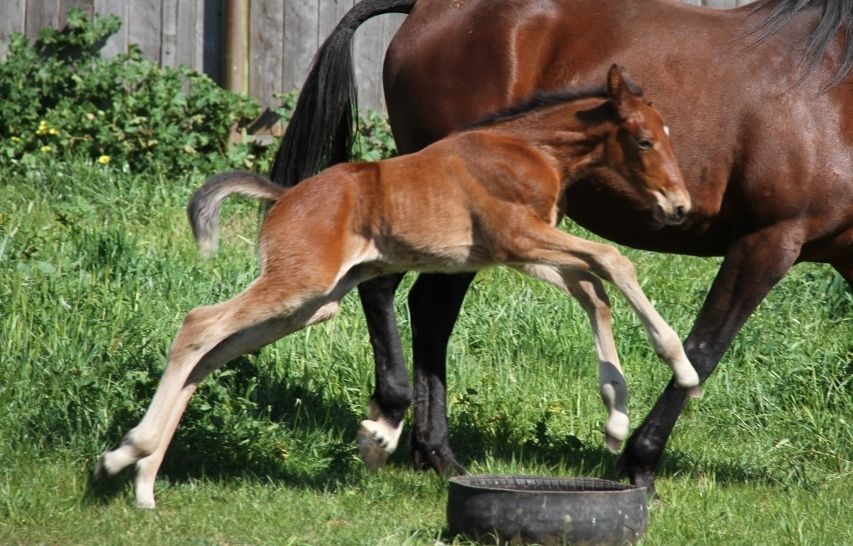
A key interest at Pepper Tree Farm Equine Clinic is the evaluation and management of equine neonates from conception through to the end of the neonatal period (i.e. first 30days of life). Bree has undertaken further training in this area from some of the world’s foremost equine medicine specialists.
The clinic is therefore able to offer a range of procedures to ensure your mare delivers a healthy foal, including:
The clinic is equipped with purpose built foaling facilities to assist in the safe delivery of your foal. With Dr Brianna Vandyke on site and trained nursing staff able to watch the mares around the clock in fully flood lit paddocks containing individual foaling yards fenced with foal safe netting we are able to reduce relieve the stress of your mare’s foaling.
For any horse owner who chooses to foal down their own mare should know what is normal. The normal gestation for a mare can range from 320 to 360 days, with an average of 345 days.
When the mare is ready to foal it will occur in three stages….
The first stage is generally the longest and may take up to four hours. The mare will be restless, standing up and down frequently, circling in the stall or paddock. Mild signs of abdominal discomfort such as looking at her flanks or sweating is also normal.
The second stage happens very quickly and in a normal foaling should be complete within 20 minutes. This stage begins when the mare’s “water” breaks and ends when the foal has been delivered. Once her “water” breaks the mare will generally lay down if she hasn’t done so already. The two front feet should be delivered first, with the soles pointing down and one foot slightly in front of the other. The foal’s muzzle should be visible at the level of its knees. If the foal is not in this presentation contact your vet immediately. The normal foal is encased in the thin, transparent/whitish membrane commonly known as the “foal sac” or amnion. If red placenta is visible this can indicate a serious problem (“red- bag delivery”) and again your vet should be contacted immediately. If the foal is in a normal position, you can break the foal sac and apply some gentle traction to the foal’s legs as your mare contracts. Ropes or chains should only be used to assist delivery if you have been shown how to do so safely. Once the foal is delivered safely remove the amnion (“foal sac”) off the foal’s face and clear the foal’s nostrils from any fluid so that the foal can breathe. The foal should be bright and active and meet the normal foal milestones as outlined below.
The final stage is the expulsion of the placenta. If the placenta has not been expelled intact after three hours it is considered to be retained. A retained placenta can be life threatening for your mare if not removed and treated appropriately. Should your mare not expel her placenta soon after foaling contact your veterinarian for further advice. A few clinical signs to watch your mare for after foaling include abnormal vaginal discharge, laminitis, colic or dull mentation/”off colour”.
With all foalings it is important to be organised with a foaling kit, the appropriate knowledge and the numbers to call if it doesn’t go according to plan. However if you would rather do away with the stress and sleepless nights the clinic is only too happy to assist with the foaling down of your mare.
.jpg)
.jpg)
.jpg)
The normal progression of stage two
.jpg)
Once your foal is safely delivered it is important to monitor the foal closely to ensure it meets normal milestones. If your foal fails to meet these milestones it may indicate something more sinister going on.
A post-foaling assessment at 12 to 24 hours old by a veterinarian will ensure your foal is meeting these milestones, be able to flag any abnormalities on physical examination which require intervention and check the foal’s blood for adequate transfer of passive immunity which is vital to your foal being able to manage any infectious substance it will encounter in the environment. We are also able to check the mare for any trauma sustained during the birthing process which may require treatment.
A foal’s health can deteriorate rapidly so it is important to check your newborn regularly and contact the clinic immediately for further advice if you have any concerns. There is no doubt that early intervention results in better outcomes. The clinic is fully equipped to intensively treat your foal should it become unwell. (Check out our Intensive Care Unit)

A healthy newborn foal